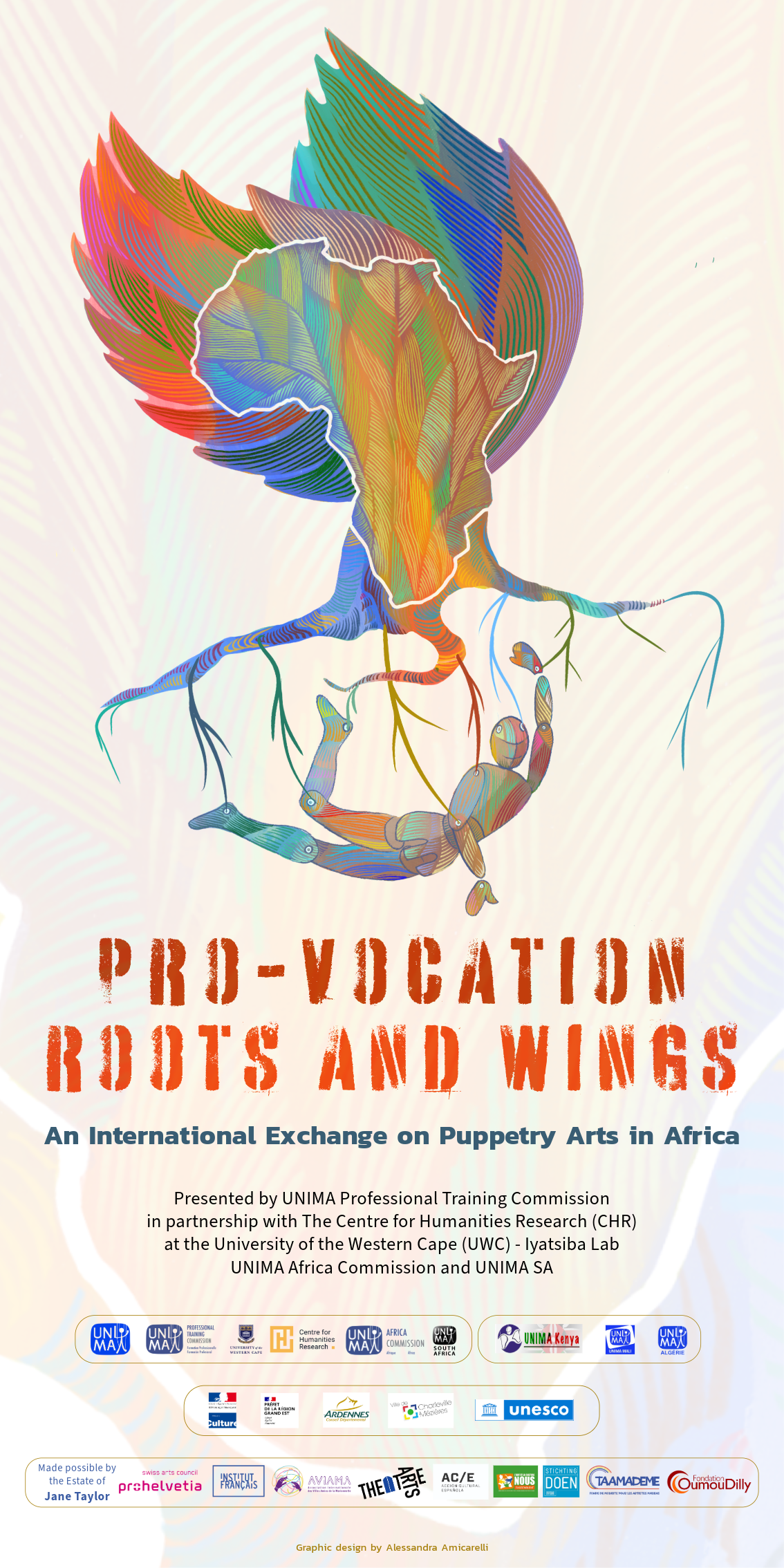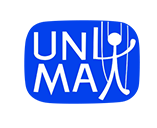
.
Pro-Vocation: Roots & Wings
An international exchange
on puppetry in Africa
NOVEMBER 2024
Pro-Vocation: Roots and Wings is an event dedicated to exploring, celebrating and promoting the rich traditions and innovative potential of African puppetry. It will take place in three phases, including three training courses, international meetings and a puppet festival, followed by an inter-African seminar. This event is a platform for international cooperation and the development of puppetry arts on the continent.
In today’s artistic practice of puppetry, tradition and innovation coexist in a creative effervescence of new forms. Recognised as one of the most effective artistic tools for generating social cohesion and having an artistic impact, the art of puppetry has been finding its place in higher education for some years now.
As a result of these broader approaches to puppetry, in 2015 UNIMA’s Professional Training Commission initiated a series of “Pro-Vocation” meetings to explore critical issues in puppetry training. The Pro-Vocation meetings were held in 2015 in France, in 2017 in Romania and in 2019 in Brazil. Each meeting brought together participants from around 25 countries and explored major contemporary issues in puppet training.
Offering these meetings on the African continent today is part of a dynamic that has been underway on the continent since 2020. The last project led by UNIMA in 2023 and supported by UNESCO, “The puppet of tomorrow in Africa”, offered 5 training courses and brought together 14 countries from the 4 zones of the continent.
Created in collaboration with leading higher education establishments, the “Pro-Vocation: Roots & Wings” meetings will highlight the specificities of puppetry learning methods in Africa.
.
Calendar
- Phase 1 – 4 days, from 20 to 23 November :
To bring together educators, artists and anyone interested in education issues on the continent and internationally in Cape Town, South Africa, for discussions, masterclasses and performances. Digital platforms will enable broad participation.
REGISTER TO TAKE PART REMOTELY
- Phase 2 – 3 days, from 25 to 27 November :
To enable bridgeheads from countries across the continent to meet and discuss a long-term development plan for puppetry in Africa. The physical exchange between heads of thread is particularly crucial for the (many) young UNIMA centres on the continent, in order to support them in the difficult task of structuring a sector in a country.
- Phase 3 – 5 days, first semester 2025
International training courses and practical explorations in each referral centre per zone (North, East, West Africa).
.
Phase 1 – The 4e Pro-Vocation meetings
The UNIMA Professional Training Commission, together with members of the Africa Commission, is organising the 4th International Meeting on Training in the Puppetry Arts entitled “Pro-Vocation: Roots & Wings”, organised in collaboration with UNIMA SA (South Africa) and the Centre for Humanities Research at The University of the Western Cape (CHR at UWC), which is hosting it in Cape Town, South Africa.
During this event, participants will reflect on the diversity of scenic and dramaturgical approaches to puppetry, in Africa and elsewhere in the world, as well as pedagogical approaches, with artists, researchers and project managers. These four days of exchanges will explore four major themes in greater depth through masterclasses, conferences and round tables:
- KNOWLEDGE-SHARING SYSTEMS AND STRATEGIES
- COLLABORATION, MOBILISATION AND EXCHANGE
- ARTISTIC PRACTICE AS A VEHICLE FOR TRAINING AND RESEARCH
- REINVENTING FORMS, TRANSFORMING TECHNOLOGIES
It is above all a meeting of ideas about what puppetry is, how it can be learned and therefore taught. It’s about learning from each other about different approaches to teaching, so that we can move forward collectively and become stronger in the face of regional and global training challenges. It’s also about linking the academic world with the artistic sector.
To ensure the widest possible access for all, the meeting will be broadcast so that it can be followed on digital platforms. It will be available in French and English.
.
Phase 2 – The inter-African meeting
Artistic expression in the puppetry sector has become increasingly important over the last decade: several UNIMA centres have been set up in Africa in recent years.
With the aim of coordinating the action of these centres on the scale of the African continent, to set up a plea for the defence of the art of the puppet, to facilitate the financing, the training, the creation, the diffusion of the African puppeteer artists in the whole of the African commission of the UNIMA, regular meetings of reflection were set up.
During Pro-Vocation: Roots & Wings, a major cultural event in South Africa in 2024 devoted to the puppetry arts, we felt it was important to organise one of the first major inter-African meetings of puppeteers during this event.
With a view to putting in place a common action plan and development strategies, the Africa Commission is therefore organising a three-day meeting in November 2024:
- Discussions and group work on how to work on administrative and institutional structuring.
- Development prospects for African centres.
- Consider harmonising the dates and activities of the various puppet festivals.
- Innovative approaches to making and creating puppet shows, with a presentation of some examples and how they work.
- The main avenues of contemporary creation with a view to facilitating the international distribution of shows.
- Prospects for the development of African centres, support for contemporary artistic creation and mobility within the framework of the African Commission.
- Possible collaboration and co-production projects between the centres
- A 5-10 year development plan and a structure for UNIMA’s Africa Commission
.
Phase 3 – International training
The aim of the international training courses held in the continent’s three zones will be to bring together puppeteers from the zone to explore new forms of artistic practice. They will take place in the first semester 2025.
The courses will take place in Mali – in French – for puppeteers from the National Centres of West Africa, in Kenya – in English – for the National Centres of East Africa, and in Algeria – in Arabic – for the National Centres of North Africa.
Each of these international training courses plans to welcome 20 trainees from the area. These courses are open only to puppeteers living on the continent, and priority will be given to puppeteers from countries where UNIMA has a National Centre or a representative.
The training will be free of charge.
Applicants must be up to date with their membership of their National Centre.
The call for bids will be launched between end 2024 and begging 2025.
.
Partners and supporters
The conference, which will be held in Cape Town, South Africa, in the Iyatsiba Lab of the Centre for Humanities Research at the University of the Western Cape (CHR at UWC), aims to welcome participants from all over the world.
The four host countries and institutions are UNIMA South Africa with the Iyatsiba Lab (from CHR to UWC), UNIMA Kenya with the University of Nairobi, UNIMA Mali with the Institut National des Arts (ina) and the Conservatoire des Métiers Ballafasseke Kouyate (cam), and UNIMA Algeria with ISMAS.
This event is organised by the UNIMA Professional Training and Africa Commissions, in collaboration with the UNIMAs of South Africa, Mali, Kenya and Algeria, the Research Commission of UNIMA and the Iyatsiba Lab of the Centre de Recherche en Sciences Humaines (CHR at UWC).
To date, the project has been funded by UNIMA, UNIMA SA, the Centre for Humanities Research at the University of the Western Cape (CHR at UWC), UNIMA Mali, UNIMA Kenya and UNIMA Algeria. It is supported by the Institut français, AVIAMA – Association des Villes Amies de la Marionnette et l’UNESCO.
UNIMA is funded by the French Ministry of Culture, the Grand Est region and the Ardennes department.
